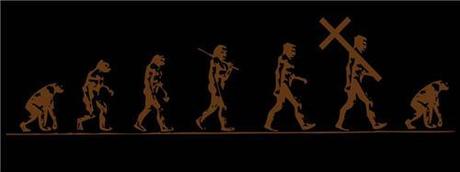If I understand my Catholic friends and scholars correctly, God created the cosmos, earth, and life. He sparked the original organism and designed an evolutionary process that has resulted in endless forms most beautiful and wonderful. But of all these forms, one stands out and one was the goal from the beginning: humans. When this God created the Ur-organism he envisioned the evolution of humanity billions of years later, the inexorable result of endless adaptation. He also envisioned the evolution of religion in general and Catholic Christianity in particular.
This is Evolutionary Theism. Evolutionary theists bring several assumptions to their scholarly work and interpret data through the following lens: (1) evolution is not random but is designed, (2) because it is designed, evolution is progressive, (3) evolutionary progress occurs through adaptive change, and (4) this adaptive change is directed toward the evolution of humans. With the evolution of humans, we finally have creatures capable of perceiving and worshiping the God who made it all happen.

This is not simple or crude Creationism, whether of the young or old earth variety. Nor is it Intelligent Design, which posits an interventionist entity whose many finely-tuned creations give the false impression there has been evolution. Evolutionary Theism accepts deep time, cosmic change, earth history, and evolutionary processes. But it does so with the understanding that none of this is random: it was designed to unfold in a particular way with a particular goal. Everything has been foreseen and foreordained.
None of this presents a problem so long as it is acknowledged. The problem arises when scholars of this persuasion present their work as if disinterested contemplation of data has led to their conclusions.
While it is not possible to approach data with nothing at all in mind, it is possible to approach data without any a priori commitments to the existence or non-existence of an entity or force called God. Scholars who have such commitments are bound to interpret their data in a particular way. In the case of Evolutionary Theists, this interpretation nearly always entails a designed and directed evolutionary progression, with one adaptation after another leading ineluctably to humans who can contemplate the majesty of God.
In paleontology, Simon Conway Morris does this. In evolutionary biology, Michael Blume does it. In evolutionary psychology, Matt Rossano does it. In archaeology, Klaus Schmidt seems to be doing it.
While working on the five-part Göbekli Tepe series for this blog, I came across several articles which noted that the discoverer and excavator Schmidt is Catholic. There is of course nothing wrong with this but it may explain Schmidt’s premature and probably erroneous interpretation of Göbekli Tepe as the place where shamanistic hunter-gatherers saw the light, sensed the presence of gods (or God), built monuments for worship, and discovered how to domesticate plants-animals. As this story goes, a new “religion” magically or supernaturally appeared and paved the way for subsequent civilization.
If one is an Evolutionary Theist, this extraordinary and otherwise inexplicable progression makes complete sense: history is teleological and the ground was being prepared not only for plants but also for Christianity. If one is not an Evolutionary Theist, the alleged progression is questionable and inexplicable.
Should scholarly and scientific Evolutionary Theists disclose their a priori commitments when publishing or presenting? Should their ideas be viewed with a certain amount of suspicion? Is everything designed, progressive, and adaptive? Are Christian humans the Telos?


